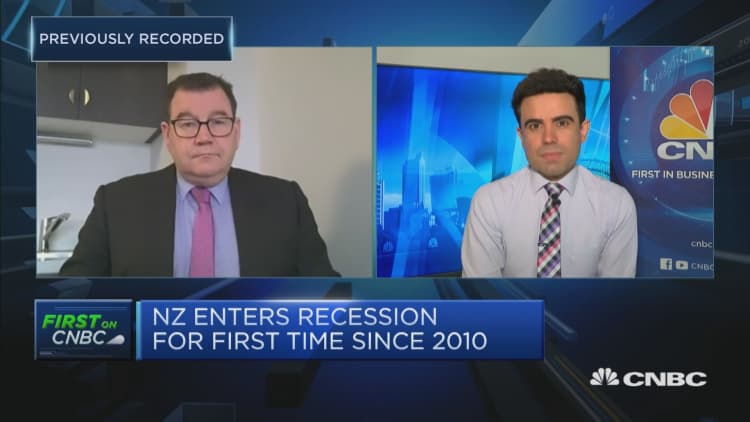New Zealand Prime Minister Jacinda Ardern's center-left Labour Party won a landslide victory in national elections Saturday as voters endorsed her government's efforts to stamp out the coronavirus.
With 80% of ballots counted, Labour had almost twice the vote of its main rival, the conservative National Party, which conceded defeat. Labour was also projected to have enough seats in parliament to form New Zealand's first single-party government in more than two decades.
New Zealand, a longstanding U.S. ally, elects its government through a proportional system that allocates seats in a single legislature based on a party's share of the total vote. Coalition governments have been the uninterrupted norm since the proportional system began in 1996.
Labour campaigned on a higher tax rate for the wealthiest 2% of earners while National promised temporary tax cuts across the board to stimulate the economy. But for many voters, the election was only about the pandemic. They rewarded Ms. Ardern's government for its success in limiting the spread of the coronavirus and for opening a gusher of spending that for now has prevented job losses and business closures from spiraling.

New Zealand, which followed a strategy of stamping out the virus rather than trying to slow its spread, has had little more than 1,500 cases and only 25 deaths. Analysts said the atmosphere of crisis favored the incumbent and National undermined its claims to be the more natural fit for government by flitting through leaders this year.
Its third choice just weeks before the election, Judith Collins, was the better performer in some of the leaders' debates, but unlike her rival, failed to make a sweeping connection with voters.
In a speech to jubilant party faithful, Ms. Ardern acknowledged that she had won significant support from New Zealanders who wouldn't usually vote for Labour.
"Governing for every New Zealander has never been so important," she said. "We are living in an increasingly polarized world. A place where more and more people have lost the ability to see one another's point of view, " she said.
"I hope that in this election, New Zealand has shown that this is not who we are, that as a nation we can listen and debate."
Ms. Ardern, who rose to international prominence by becoming a mother during her premiership and for her empathetic response to the March 2019 terrorist attack on mosques in Christchurch, has captured the imagination of many in New Zealand and abroad with political messaging that seems personal and authentic.
Like President Donald Trump, she frequently sidesteps mainstream news organizations and uses social media, such as Instagram videos and Facebook live streams from her home, to communicate directly with supporters.
The election result is unlikely to change the broad economic policy settings in New Zealand, said Duncan Grant, an associate professor at Massey University who specializes in New Zealand politics and public policy. Labour and National both hew to the middle ground, he said, and favor free trade, an independent central bank and a tax system that redistributes some wealth to pay for public services.
But Jack Vowles, a political scientist at Victoria University, said it could cement Labour as the governing party for two more terms, allowing it to shift further away from the neoliberal economics that have dominated the thinking of policy makers in New Zealand and other Western countries since the 1980s.
The left bloc of Labour and the Green Party have secured about 56 percent of the vote based on the partial results, up from 43 percent in 2017.
"We're potentially in for quite a long period of Labour-led governments, which I think would be of considerable historical significance, particularly given continuing uncertainties in the global economy and the challenges of climate change," Mr. Vowles said.
"Whatever government is in office in New Zealand over the next three to six years is going to shape policy in a way that might not have been the case in normal times."
Despite Ms. Ardern's popularity, the Labour Party had been flagging in opinion polls before the pandemic. The government had failed to deliver on signature policies such as boosting the supply of affordable housing and reducing a rate of child poverty that is high by developed-nation standards. But its support soared to nearly 60% in opinion polls earlier this year as coronavirus death tolls rose in the U.S. and some European countries while New Zealand remained largely virus free.
Ms. Ardern maximized New Zealand's inherent advantages in a pandemic of remote island geography and low population by closing borders and imposing one of the world's strictest lockdowns that kept people at home and closed most business for about six weeks starting late in March.
In frequent televised news conferences, she persuaded the country to accept the draconian measures with a combination of dire warnings and memorable slogans such as "go early and go hard" and "team of five million," in reference to New Zealand's entire population.
The lockdown caused the economy to contract a record 12.2% in the second quarter, but the number of people applying for jobless support hasn't risen dramatically.
Wage subsidies and other support measures that will cost nearly 20% of gross domestic product and triple government debt have minimized the economic and social pain, partly by pushing some of it into the future. New Zealand's indebtedness, however, will at its peak still be low compared with countries such as Japan and the U.S.

